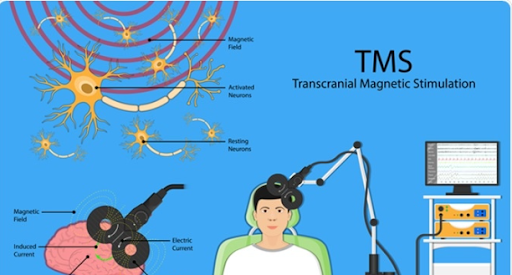
Transcranial Magnetic Stimulation (TMS) is a non-invasive brain stimulation technique that uses electromagnetic pulses to stimulate specific areas of the brain. TMS is commonly used in the treatment of various neurological and psychiatric disorders, including major depression, anxiety, obsessive-compulsive disorder, and chronic pain.
As a TMS doctor, your role is to evaluate patients who may benefit from TMS treatment, design treatment plans, and administer TMS therapy. You must have a thorough understanding of the principles of TMS, including its mechanism of action, safety, and efficacy.
Obtaining education and practice
The first step in becoming a Transcranial Magnetic Stimulation expert is to obtain the necessary education and training. This typically involves completing medical school and a residency program in a relevant field such as psychiatry or neurology. After completing your residency, you may choose to pursue a fellowship in TMS, which will provide specialized training in the use of TMS for various disorders.
To become a Transcranial Magnetic Stimulation doctor, you must also stay up-to-date with the latest research and developments in the field. This may involve attending conferences, reading scientific journals, and collaborating with other experts in the field.
When evaluating patients for TMS treatment, you must conduct a thorough assessment to determine if they are good candidates for TMS therapy. This may involve reviewing their medical history, performing a physical examination, and conducting psychological assessments.
Designing tailored treatments
Once you have determined that a patient is a good candidate for TMS therapy, you must design a treatment plan that is tailored to their individual needs. This may involve determining the appropriate stimulation parameters, including the frequency, intensity, and duration of the magnetic pulses.
Working with other health specialists
During TMS therapy, the experts monitors the patient for any adverse effects and adjust the treatment parameters as needed. These experts also work closely with other healthcare providers, such as psychiatrists or pain management specialists, to ensure that the patient receives comprehensive care.
Effective communication skills
As a Transcranial Magnetic Stimulation doctor, you must also have strong communication skills to effectively communicate with patients and their families about the benefits and potential risks of TMS therapy. You should be able to answer their questions and provide reassurance, as well as provide clear instructions on how to prepare for TMS sessions and what to expect during and after the treatment.
Clinical research and trials
In addition to clinical work, Transcranial Magnetic Stimulation experts may also be involved in research and clinical trials to advance the field of TMS. This may involve investigating new TMS protocols or evaluating the efficacy of TMS for various conditions.
Adhering to ethical standards
It is also important for Transcranial Magnetic Stimulation experts to adhere to ethical and professional standards, including maintaining patient confidentiality, obtaining informed consent, and ensuring that patients are treated with respect and dignity.
Working in a variety of settings
TMS experts may work in a variety of settings, including hospitals, clinics, research institutions, or private practices. They may also work as part of a multidisciplinary team, collaborating with other healthcare providers such as psychologists, psychiatrists, or pain specialists to ensure that patients receive comprehensive care.
Educating other healthcare professionals
In addition to treating patients with TMS therapy, Transcranial Magnetic Stimulation doctor may also be involved in educating other healthcare professionals about the benefits and potential risks of TMS. They may also provide training to other clinicians on how to administer TMS therapy safely and effectively.
Overall, being a TMS doctor can be a rewarding career that allows you to help patients with a range of neurological and psychiatric disorders. With the ongoing advancements in TMS technology and research, there is much potential for further development and expansion of this field.
Finally, being a Transcranial Magnetic Stimulation doctor requires a passion for helping patients, a commitment to ongoing learning, and a dedication to providing the highest level of care. With these qualities and skills, Transcranial Magnetic Stimulation doctor experts can make a significant contribution to the field of neuroscience and the lives of the patients they treat.
In conclusion, being a TMS doctor requires a combination of education, training, and ongoing professional development. As a TMS doctor, you play a critical role in helping patients with neurological and psychiatric disorders improve their quality of life through the use of TMS therapy.
You may be interested in: Pros and Cons of Using Electrical Muscle Stimulation Machine to Lose Weight

